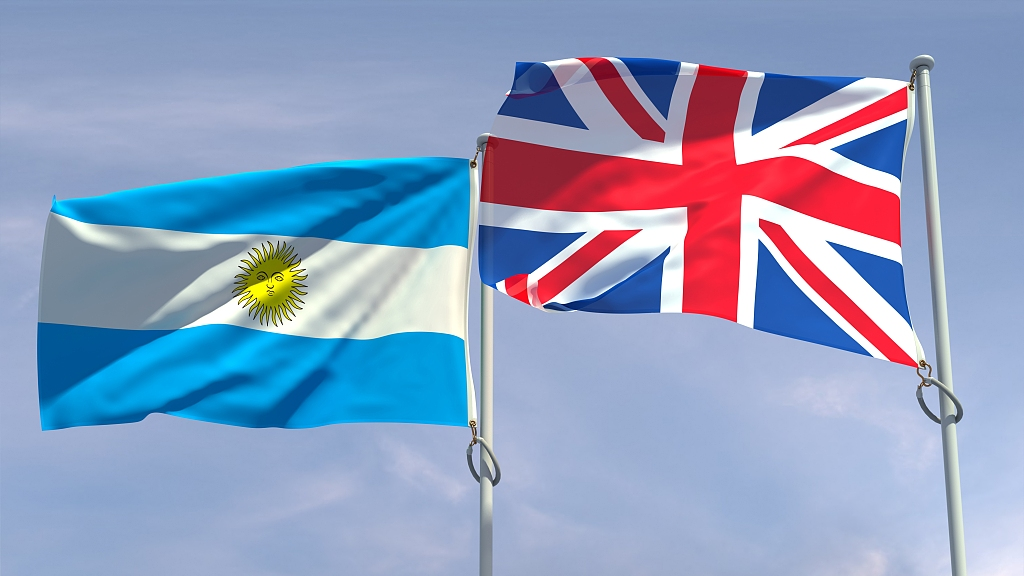
The British (R) and Argentine national flags. /CFP
The British (R) and Argentine national flags. /CFP
Editor's note: Alessandro Golombiewski Teixeira is a national Thousand Talent distinguished professor of public policy at the School of Public Policy and Management, Tsinghua University, and a professor of international business at Schwarzman College at Tsinghua. He is a former special economic advisor to the president of Brazil, former Brazilian minister of tourism, and minister of development, industry and foreign trade. He was also president of the World Investment Association. The article reflects the author's views, not necessarily those of CGTN.
Recently, during the visit of Argentine President Alberto Fernandez for the opening of the Beijing Winter Olympics, the Argentinian government has asked China to support the South American country in two very important political movements. One is to be a member of the BRICS mechanism and the second one is to reclaim sovereignty over the territory of the Falkland Islands (Malvinas Islands in Spanish).
In the year marking the 50th anniversary of the establishment of diplomatic relations between China and Argentina, the two countries have issued a joint statement on deepening partnership. Besides, China firmly supports Argentina's legitimate claim to exercise full sovereignty over the Malvinas Islands, which is out of morality and reality.
Since 1982, when the UK and Argentina started an armed dispute from April 2 until June 14 for the Malvinas Islands, China has supported Argentina's full exercise of sovereignty over the Malvinas Islands based on its consistent anti-colonial stance. "China has always maintained that territorial disputes between countries should be resolved through peaceful negotiations in line with the purposes and principles of the UN Charter," the Chinese embassy spokesperson in the UK said in an online statement published on February 8.
The problems in the Malvinas Islands started much earlier in the 18th century. The islands are about 500 kilometers east of Patagonia in southern Argentina. In 1765, the UK had a naval base on one of the islands, later named Falkland. The UK then began a process of withdrawing its military garrisons overseas.
With Argentina's independence in 1816, the country claimed sovereignty over the Malvinas Islands in 1820. The Argentine government granted a concession to explore the islands to Frenchman Louis Vernet, who later obtained permission to found a colony. With the success of Vernet's colonization and exploration of the land, Britain and Argentina became interested in the islands again. The British colonization had effectively begun since 1839, with the completion of the construction and the designation of Stanley as the new and current capital in 1845.
The Malvinas Islands issue was the subject of several subsequent resolutions of the UN General Assembly, which ratified the request that the countries involved reach a peaceful solution.

A line of British soldiers in camouflage advancing during the Falklands War, 1982. /CFP
A line of British soldiers in camouflage advancing during the Falklands War, 1982. /CFP
However, despite the UN manifestations, the Malvinas Islands have been the subject of a long-standing sovereignty dispute between Argentina and the UK. The bilateral negotiations have not advanced. The UK government used an argument that this territory belongs to the UK family, according to Liz Truss, the foreign secretary of the UK. However, the so-called UK family is based on colonialism, and the UK used military force to take what does not belong to it.
The sovereignty of the islands was transferred to Argentina from Spain upon its independence in 1816. And the islands are located on the continental shelf facing Argentina, which would give them a claim, as stated in the 1958 UN Convention on the Continental Shelf. Clearly, for geographic proximity and through history, this territory belongs to Argentina, not the UK.
Although Argentina calls for a definitive solution to the dispute "through dialogue," the UK insists it will not negotiate on the grounds that sovereignty belongs to it and that the island's population voted almost 100 percent in favor of its belonging to Britain in the referendum held in 2013. Faced with the UK's colonial attitude, Argentina needs to make the international community stand up for it in a more proactive way. As the UK is no longer a member of the European Union, Argentina should also find its European friends such as France, Spain, and Italy to support its position.
Finally, the UN Charter, the Charter of the Organization of American States, international jurisprudence, and the Hague Court all declared that sovereignty is a guiding principle of equality among states and that international order is constituted by mutual respect for this institute.
People all over the world expect the dispute to be solved effectively and reasonably. It is time for the UK to abandon its colonial thinking. Mutual respect is the demand of the times. The UK should not regard invading other countries' territory as a kind of glory, especially when this region was never part of their territory. Equality, respect, and cooperation are indeed the trends of the new era and not anymore that of the colonial times.
(If you want to contribute and have specific expertise, please contact us at opinions@cgtn.com.)

